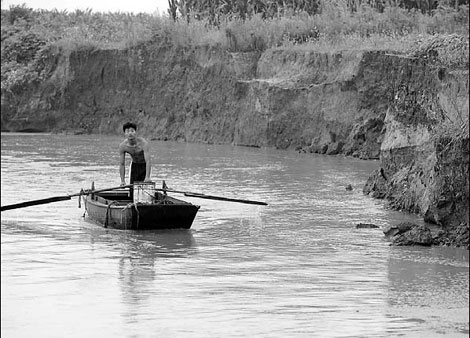Draft aims to protect country from soil erosion
China may forbid projects that cause water and soil erosion following frequent geological disasters that have rampaged the country this year.
 |
|
A fisherman rows his boat beside an eroded riverbank along the Wuhemo section of a mainstream of the Huaihe River, in Anhui province on July 21. [Liu Junxi / Xinhua] |
The Standing Committee of the National People's Congress (NPC), China's top legislature, started its first reading of the draft amendment to the Water and Soil Conservation Law on Monday in a bid to protect the country's fragile environment.
The draft amendment is based on the country's experience with water and soil conservation over the past two decades as well as field investigations in Sichuan and Guangdong provinces.
Zhou Ying, vice-minister of water resources, told legislators that construction and production projects will be limited in order to protect plants and soil in fragile areas.
The draft amendment strictly forbids the destruction of forests and digging of holes in the ground in areas with serious water and soil erosion problems.
Companies and individuals damaging the environment must either plant trees or pay a water and soil conservation fee, it says.
If a construction project is not assessed by local authorities, the developer will be slapped with a fine from 50,000 yuan to 200,000 yuan (US$7,350 to US$29,410), the draft says.
The draft amendment also requires construction companies and local governments to bear the responsibility of monitoring water and soil erosion, which is threatening food safety and the environment in the country.
A report released in 2008 by the Ministry of Water Resources said about 40 percent of the country's land area - about 3.6 million square kilometers - is suffering from water and soil erosion and a total of 4.5 billion tons of soil is eroded every year.
The report estimated that if the trend continues for another five decades, erosion will take away 930,000 hectares of arable land of the fertile northeast area, cutting its annual crop output by 40 percent.
Increasing geological disasters such as mudslides and landslides are also partially a result of water and soil erosion, said Shen Guofang, an academician at the Chinese Academy of Engineering.
As of Sunday, at least 1,435 people were confirmed dead and another 330 are missing two weeks after mudslides triggered by torrents hit Zhouqu county, Gansu province, on Aug 8.
On Aug 18, mudslides caused by torrential downpours hit the mountainous Gongshan of southwestern China's Yunnan province, leaving 29 dead and 63 missing as of Sunday.
Rain-triggered mudslides also killed at least 18 people in Wenchuan and Qingchuan counties in southwest China's Sichuan province, which is still recovering from the massive earthquake in 2008.
 0
0 






